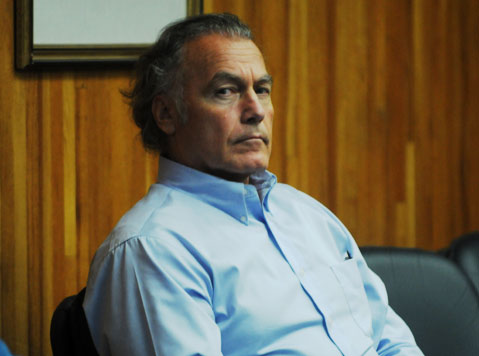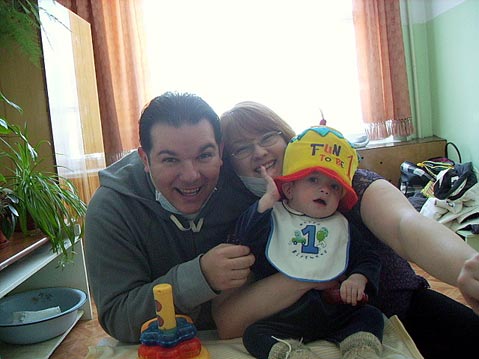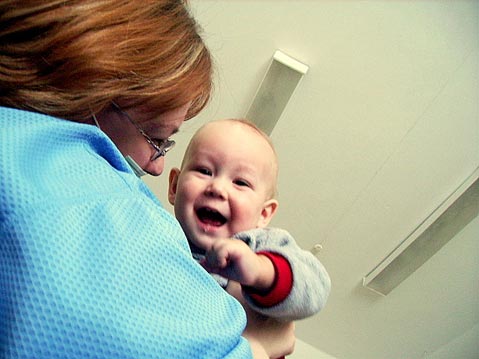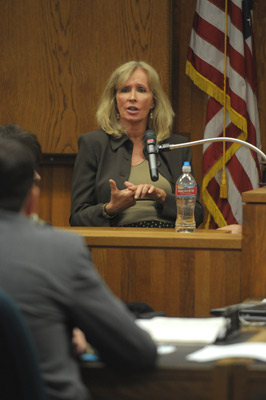The False Prophet of Adoption
Using Babies as Bait, Montecito's Orson Mozes's Led 17 Families on Global Goose Chases

In January 2007, Valarie and Greg Neaderbaomer were finally ready to adopt a child. After researching online and visiting various agencies, the couple decided to do their adoption through Adoption International Program (AIP). They had seen a little girl from Kazakhstan on the Internet, and Orson Mozes, the Montecito-based director of AIP, told them she was still available. So the Temple City, California, couple started to proceed with the adoption.
And what a process it was. Thousands of dollars-often more than $8,000 up front for AIP applicants-police and FBI background checkups, repeated doctor appointments, multiple social worker visits, a full financial audit, and more were all part of the time-consuming and costly process to adopt the girl. Valarie estimated that they had to have more than five pounds of paper documents notarized, then notarized again. “It’s just a lot and hard to explain,” she recalled earlier this year. “The paperwork is not easy.”
In the meantime, Mozes sent the couple updated photos of their soon-to-be-daughter, photos they would put on their refrigerator as they prepared for their new child’s arrival. All along, Mozes assured them their child was waiting for them, healthy and happy. “And then,” said Valarie, “it just all fell apart.” Paperwork stopped being processed, and they soon discovered that Mozes, or anybody for that matter, could not hold any Kazakhstani child for adoption-the Central Asian republic allows families to be matched with a child only after meeting several children at an in-country orphanage. “He wasn’t supposed to be doing that,” said Valarie, “let alone promising kids to multiple families.”
By the time the adoption failed, the Neaderbaomers had spent about $15,000. But the money is just a fraction of the pain for prospective parents who are blocked from adopting the child they’ve fallen for. “It was very frustrating at the time, and very emotionally draining,” said Valarie, who would later learn that Mozes had promised the same girl to two other families. Throughout time-and via the power of the Internet-the couple found other families experiencing similar issues and heard sad story after sad story about the heartlessly fraudulent practices of Orson Mozes and AIP. But while the culprit was a constant, the deceit often was not the same.

For one couple, Dawn and Joe De Lorenzo, the truth came mere weeks before they were set to travel overseas to see the boy they’d started to call their son. He was no longer available, wrote Mozes, explaining that he was using email because it hurt him too much to deliver the news over the phone. The child’s birthmother had come forward and didn’t want him adopted, claimed Mozes, but that too turned out to be a lie. After consulting with the U.S. Embassy in Kazakhstan, the De Lorenzos learned that the baby boy was never available for adoption in the first place. Despite that setback, when Mozes found them a replacement, the couple flew over to bond with another boy, celebrating his first birthday together in an orphanage. The next day, however, the De Lorenzos were told his mother returned and did not want him adopted, eventually finding out that this child was not legally available for adoption either. Emotionally torn yet eager to be parents, they were convinced to try on a third and final child by Mozes, but that attempt fizzled, too. After enduring more than two months in Kazakhstan and spending roughly $75,000, the De Lorenzos still had no child of their own.
And then there’s Jennifer Baggerly, a single mother-to-be who was assured by Mozes-via health records and otherwise-that her adopted child would not have special needs, a common claim from the man who assured people that he had connections to the “best,” the “healthiest,” and the best-looking kids. But when she flew over to Kazakhstan to complete the adoption, the young girl had severe scoliosis and was missing vertebrae in her neck. “It was one of the worst days in my life, and my parents’ lives,” explained Baggerly, who’d spent $5,000 for the experience. “We had to make the heart-wrenching decision to leave her there in that orphanage.”
Heart-wrenching only begins to describe how these families felt. Receiving photo and video updates of the children they were ready to adopt, the soon-to-be parents would begin to call them son and daughter, would-be siblings calling them brother or sister. Nurseries were built, clothes and toys were bought, and investments were made of both the emotional and monetary kind. As one woman put it, her family “made room in their hearts” for the girl they were going to adopt.
But more often than not, it was all for nothing. Out of the 59 families who were part of a recently concluded criminal investigation of Mozes, 43 never ended up getting a child through AIP. Though the other 16 did, none of them adopted the child they originally sought. Explained Santa Barbara County Senior Deputy District Attorney Paula Waldman, who prosecuted Mozes, “They feel like their very own child was taken from them.”
By July 2, 2009, it had been almost four months since Orson Mozes first took to his cell in the Santa Barbara County Jail. That morning, Mozes was scheduled to be in court to set a date for his preliminary hearing, but word on the street was that he would take the plea bargain offered by the prosecution.
Sitting in the courtroom that day, Mozes brought to mind the now infamous Ponzi-schemer Bernie Madoff. Perhaps it was his appearance: Dressed in a blue shirt and tie, Mozes sported a balding head of hair, black on top but graying down the sides to his sideburns, slicked down the back into long waves. Or maybe it was the laundry list of crimes to which he did indeed plead guilty: 17 felony counts of obtaining money by false pretenses with a special circumstance of aggravated white-collar crime. He would be sentenced to three years and four months in state prison.

According to prosecutor Waldman, Mozes bilked more than $800,000 from families throughout the United States who were looking to adopt a child from overseas. Along the way, his company was pulling in about $25,000 a month, allowing Mozes to live with his now former wife and two children in a multimillion-dollar, luxuriously decorated mansion on School House Road in Montecito, where it’s been said that he enjoyed the services of a private chef for some time.
Those may not be Madoffian numbers, but to the 59 victimized families, it amounts to more than a fortune. Some spent several years of their lives trying to adopt through Mozes’s agency, and most paid in excess of $10,000, many having to refinance homes or borrow money from relatives. And there’s no way to put a price on the emotional heartache, as the efforts exhausted in reaching out to love a child who has never experienced parental affection cannot be recouped. “He emotionally raped each and every one of us,” wrote one victim, Tina Howard. “To him, this was all about the money. To us, this was our child, our heart.”
Despite his pending prison time, Mozes appeared relieved that day in court, even laughing at different exchanges during the hearing. “I feel very comfortable,” Mozes told the court, though he later expressed concern about being able to get a passport. “I don’t think Mr. Mozes will have a need for a passport in the next three years,” replied Judge George Eskin. Eskin did, however, grant one request from Mozes, promising to recommend that the felon be able to serve his probation in Florida after his sentence is over. That’s where his fiancee lives, Mozes explained to the court, and they plan to get married while he’s in prison.

Orson Mozes’s dive into adoption work certainly was unconventional. Prior to adoptions, Mozes-who moved to the Santa Barbara area in 1985 with his wife, Christen Brown-made a living designing and selling shoes, leathers, and furs. In 1991, a couple at their church told Mozes and Brown that they were trying to adopt a child. Since his half-brother lived in Romania, Mozes agreed to make some calls and see what he could do to help. The transaction was successful, and soon others were approaching Mozes to get adoption help.
His early success led Mozes to a job with Adoption Services Associates, a company based in San Antonio. But after 10 years on the job, Mozes was sued by the company’s owner for fraudulent business practices that, according to court records, “resulted in numerous complaints and forced him out of business.” During that time, according to later testimony from Brown (they split in 2007), Mozes fell into a deep depression, threatened to kill himself over the lawsuit, and began taking antidepressants.
During those dark days of 2001, Mozes convinced Brown to help him start an adoption agency. He had no higher education, but Brown-who today runs a business called On Camera, which trains people to speak on video-possessed a Masters in psychology, the sort of legitimate background required for such a company. Though they operated out of their Montecito mansion, Brown and Mozes incorporated Adoption International Program in Pennsylvania, where adoption agency licensing is known to be lenient. AIP started with adoptions in Kazakhstan, and then eventually expanded to Azerbaijan and the Ukraine.
Calm, laidback, and jovial, Mozes-who described himself on a match.com dating profile as a good listener and talker, with a lot of energy who is “sensitive to life”-had the required traits of a good frontman and proved a likable agent, at least at first. But it didn’t take long for his greed to emerge. “He was nice to a certain extent,” remembered Valarie Neaderbaomer. “When he wanted the money, he would say the right thing, and he was forceful. He knew how to talk. He knew how to BS.”
A former employee of AIP had the same impression. “You could sense there was a high interest in payment,” said the woman, who used to joke with fellow staff members about there being two sets of financial books. This worker, who eventually called the IRS about the company, witnessed Mozes enjoying a “high-end lifestyle” off the money he made from adoptions. Indeed, on the dating profile he started after his 2007 divorce, Mozes listed his income as greater than $150,000 and boasted that he can “work anywhere, as much or as little as I want.”
Aside from being good at spending the money he earned by lying to his customers, Mozes also made sure his victims didn’t find each other. Calling Mozes a “master manipulator,” Dawn De Lorenzo explained, “He managed to keep [parents] who were his clients from talking to each other by scaring them into thinking that other people would want to ‘steal’ their referral and that the Kazakhstan government was reading U.S. blogs.”
Unfortunately, scammers like Mozes are all too common in the adoption world, according to Lynne Banks, who started adoptionscams.net to help families avoid and deal with adoption scams. Adoptions are very complex, and the process is mindboggling to figure out, forcing families to put enormous amounts of trust-and money-into the hands of agencies. “It’s very hard to protect yourself,” said Banks, who recommends doing as much research as possible to ferret out the unethical agencies and con artists trying to take advantage of often desperate families. “When you have a gut feeling, you need to start asking questions,” she said. “When you feel you’re not getting the answers you need, you should go to a higher authority.”
That’s what happened in this case, when a group of families, led by the De Lorenzos, approached the Santa Barbara District Attorney’s office in late 2005, which then began looking into Mozes’s practices. Though they’ll never be sure when Mozes’s pattern of deception first began, authorities know it stretches at least as far back to February 2004.
Though it would be a couple years until Mozes’s house of cards started to crumble, his home life must have been suffering during his charade, because in July 2006, Brown filed for divorce. Because of financial constraints, the two continued to live together until June 22, 2007. That, according to divorce papers filed by his wife (who declined to be interviewed for this story), was “the day he moved out, unannounced, and never returned.”
Mozes’s abrupt escape was accompanied only by a letter to his ex-wife and children in which he tells Brown that she “destroyed my heart and life.” Mozes continued, “I never would have thought divorce was to be for us; I would have done anything to keep us together. I never knew you; and how much money means to you.” He would later claim that the deteriorated relationship with his wife was why he ran away and disappeared for years.
But there’s plenty of evidence to suggest that Mozes left for other reasons, and it wasn’t only to run from the crimes of his company. Just prior to his disappearance, a teacher of Mozes’s daughter-who was adopted from Russia in 1994-filed a child abuse report with Child Welfare Services. The girl apparently told her teacher that Mozes had touched her inappropriately, a charge relayed to the Sheriff’s Department. But, said investigator Norma Hansen in the District Attorney’s office, there was a “lack of enough evidence to do anything with it.”
With Mozes on the lam, AIP sent out letters in September 2007, informing clients that the agency had exhausted its financial resources and was “forced to cease operations” due to the “sudden departure of Orson Mozes and the economic problems that his unexpected departure had created.” Pending adoptions were halted, and some were transferred to other agencies.
By the time authorities issued an arrest warrant for Mozes in March 2008, he was long gone. With family connections in Eastern Europe and dual citizenship in Canada, he could have been anywhere. In the June 2007 letter he left his family, Mozes told his twenty-something son, Zack, if he could “continue without going crazy,” he wouldn’t have left. Mozes wrote, “I do not see a life without Mom and Zoe and you.” But even that turned out to be a lie. Mozes had, in fact, started his life over in Florida.
Armed with the loads of cash he brought with him when he took off, Mozes moved to the Sunshine State, where he met a woman named Suzanne Crispell, who worked in dentistry in the Miami area. Mozes had rechristened himself with the alias Jack Rose, and Crispell rented him an apartment on the beach. Around this time, Mozes’s saga was aired nationally on America’s Most Wanted, but he was able to live under the radar for another several months.
Mozes’s apparently inherent inability to follow the law proved to be his ultimate undoing. While on the loose, he actually was detained twice by authorities in Florida-once for a routine traffic stop, where he slipped away after providing a fake license, and again for petty theft and shoplifting charges on December 21, 2008. Although arrested, Mozes was again released after giving a phony name, Social Security number, and address. Thanks to his fingerprints, though, it wasn’t long before authorities realized who they had. Investigator Hansen learned of Mozes’s whereabouts the next day, and, in cooperation with the Miami-Dade Police Department, developed the necessary leads. Just over a week later, on December 29, 2008, Mozes was arrested for his adoption crimes.
Why he was shoplifting remains a mystery, because at the time of his arrest, Mozes had about $19,000 in cash at his residence, according to Detective Lazaro Perez of the Miami-Dade Police Department. Crispell, his landlord, turned in another $9,000 and gave the police directions to his storage unit, where they found gold coins, more cash, and receipts totaling approximately $300,000. Where that cash will wind up currently is being hashed out in court-Mozes’s ex-wife Christen Brown says she’s entitled to it, but prosecutor Paula Waldman is fighting for it on behalf of the families bilked by Mozes.
Following extradition hearings, Mozes returned to Santa Barbara in March, looking tired but calm in an interview with KEYT news. “I did my best, and I’m completely innocent,” he told the television station at the airport, explaining he had successfully completed nearly 1,000 adoptions in 15 years. “I’m sure justice will be served.” The brief clip would be his only public comment on the case-although smiling and apparently content, Mozes didn’t address the court during his sentencing hearing, didn’t respond to an interview request made through his attorney, and refused to meet with this reporter while in Santa Barbara County Jail.
Mozes’s public claims of innocence went out the window a few months later when he pled guilty to the 17 charges, a move that led to another 42 charges being thrown out. Whether justice was effectively served for the families he victimized will always be a matter of personal opinion, as some asked Judge George Eskin for a harsher sentence, and the pain was still very much evident in the many letters read at the sentencing hearing. Nonetheless, Waldman said there is a “general feeling of relief that the criminal case is put behind them.”
The fight goes on for the 17 families who have named Orson Mozes, Christen Brown, and former AIP representative Kevin Anderson in a civil lawsuit that seeks to get their squandered payments reimbursed. In a move by Waldman, the 17 felony charges that Mozes copped to are the exact ones related to the 17 plaintiffs in the lawsuit. Had Mozes not admitted nor denied guilt by pleading no contest-as is common for plea bargains and would have likely been accepted in this case-his guilt couldn’t be used against him in civil court. Now it can. No one knows why he pled guilty; his public defender, Jeff Chambliss, had no comment.
Many families have chosen to move on, hopeful that they will be paid restitution, but mostly just ready to get on with their lives. Some are too scared to try adoption again. “It makes you question your judgment,” said watchdog Lynne Banks. “It hurts your self-esteem, it affects your psyche. In their eyes, they lost a baby.”
But despite their loss, some families have a happy ending to their stories. After years of emotional heartbreak, Greg and Valarie Neaderbaomer recently completed an adoption of a little girl from Russia with a different agency. But they still wonder what happened to the baby girl who originally was supposed to be their daughter, and if she is okay. “For some reason,” said Valarie, “we weren’t meant to have that child.”



